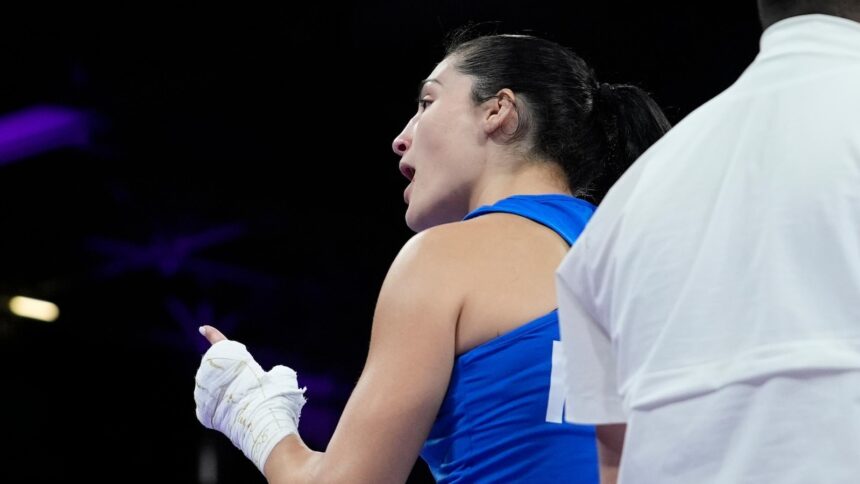PARIS — LGBTQ+ athletes, officials and observers have warned that a flood of hateful comments misidentifying female boxer Imane Khelif at the Paris Olympics as transgender or male could pose a danger to the LGBTQ+ community and female athletes.
The concern comes as prominent figures – from former US President Donald Trump to “Harry Potter” author JK Rowling – have attacked the Algerian boxer after Italian competitor Angela Carini pulled out of Thursday’s fight. Her and other social media comments falsely claim Khelif is a man against women.
The comments went viral on social media, drawing Khelif and Taiwanese boxer Lin Yu-Ting into a larger social controversy about women in sports.
International Olympic Committee spokesman Mark Adams said on Friday that Khelif was “born a woman, registered as a woman, lives as a woman, boxes as a woman, has a woman’s passport.”
He warned “not to turn it into a witch hunt.”
Some LGBTQ+ athletes and observers worry that hateful comments from critics — and the IOC’s failure to address the larger global conversation ahead of the Olympics — have begun to harm transgender, nonbinary and other LGBTQ+ people at events they champion. This is because the growing interpretation of gender identity has led to larger political battles, often focused on sports.
While the Paris Olympics pushed the agenda of openness and listed 193 openly LGBTQ+ athletes competing, a performance by a drag queen during the opening ceremony faced a strong reaction from religious conservatives and others who considered it a mockery of Leonardo da Vinci’s “Last Supper”. Several performers and the artistic director of the opening ceremony said they received threats.
Nikki Hiltz, one of the world’s top middle-distance runners who competes in the women’s category for the US Olympic team, has faced such hateful comments. Assigned female at birth, Hiltz identifies as nonbinary.
“Transphobia is going crazy at this Olympics,” Hiltz wrote in a post on Instagram in response to the boxing debate. “Anti-trans rhetoric is anti-women. These people aren’t ‘protecting women’s sports,’ they’re enforcing rigid gender norms, and anyone who doesn’t fit those norms is targeted and vilified.
The controversy is based on claims by the International Boxing Association that Khelif and Lin failed an unspecified and non-transparent eligibility test for the women’s competition, which the IOC called a “sudden and arbitrary decision” by the governing body that has banned them from the Olympics since 2019.
While some sports have detailed guidelines on transgender athletes and hormone levels in competition, boxing relies on the 2016 Olympic date rules that state the threshold for eligibility is what appears on the athlete’s passport amid a wider rift between the IBA and the IOC.
“The current aggression against these two athletes is based on all these arbitrary decisions (by the IBA), which were made without proper procedures,” said the IOC’s Adams. “This dangerous, misogynistic and baseless attack is fueled by misinformation.”
Athletes have faced “several cases of online aggression,” the IOC’s Adams said. He said it was the Olympic body’s responsibility to “look after” the athletes and “make sure they are safe.”
Although some like Cyd Zeigler, co-founder of Outsports, a site that tracks LGBTQ+ participation in the Olympics, says that the IOC’s failure to provide clarity before the Games has affected female athletes and LGBTQ+ competitors, both of whom have long struggled for recognition. .
“The issue is not the athletes trying to compete, it’s who makes the policy,” Zeigler said. “The appalling part of this is that the vitriol over the last two days has been aimed at these athletes.”
Zeigler said the backlash would hinder LGBTQ+ participation in the Games in the future even though activists say the Olympics have made great strides in recent years.
“By trying to bury an issue that they know is coming, transphobic (people) start to direct the conversation,” Zeigler said. “We can have a conversation about including trans athletes. There’s an intelligent conversation to have. It’s the vitriol, the vile, the horrible, the graphic, the horrible language that’s being used in this thing that eats at me.
Former athletes like Belgian Charline Van Snick, 33, a former judo medalist at the 2012 Games, said the testing and comments about Khelif and Hamori’s body are undoing years of work by female athletes to push back against the stigma.
While many say they have seen great progress in recent years, Ilona Maher, the star of the US women’s rugby team, cried in a social media post before the Olympics after comments that claimed she was male.
“There are some women with more testosterone, or different body types,” Van Snick said. “In judo, you fight, and you have to remain a woman, what you receive from a woman. If you look too much like a man, they say, ‘Oh, that’s a man.’ But I’m a woman” who can beat men in sports.
——
Associated Press video journalist Lujain Jo contributed from Paris.




